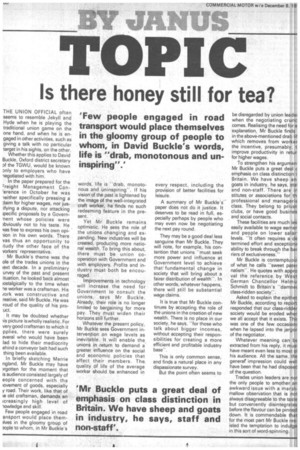TOPI
Page 82

If you've noticed an error in this article please click here to report it so we can fix it.
Is there honey still for tea?
'Few people engaged in road transport would place themselves in the gloomy group of people to whom, in David Buckle's words, life is "drab, monotonous and uninspiring".'
THE UNION OFFICIAL often seems to resemble Jekyll and Hyde when he is playing the traditional union game on the one hand, and when he is en gaged in other activities, such as giving a talk with no particular target in his sights, on the other. Whether this applies to David Buckle, Oxford district secretary of the TGWU, would be known only to employers who have negotiated with him.
In the paper prepared for the :reight Management Con'erence in October he was neither specifically pressing a 31aim for higher wages, nor jusifying a dispute, nor attacking ;pecific proposals by a Governrent whose policies were )bviously not to his taste. He vas free to express his own opilion in his own words. There vas thus an opportunity to ,tudy the other face of the vorkers' representative.
Mr Buckle's theme was the ole of the trades unions in the lex/ decade. In a preliminary urvey of the past and present ituation, he looked back almost iostalgically to the time when le worker was a craftsman. His Rork was constructive and reative, said Mr Buckle. He was roud of the quality of his prouct.
It may be doubted whether is picture is wholly realistic. For very good craftsman to which it polies, there were surely averal who would have been lad to hide their mediocrity ehind a conveyor belt had such thing been available.
In briefly sketching Merrie ngland, Mr Buckle may have )rgotten for the moment that is audience consisted largely of eople concerned with the tovement of goods, especially y road. Their work, like that of ie old craftsman, demands an icreasingly high level of nowledge and skill.
Few people engaged in road ansport would place them?Ives in the gloomy group of ?.ople to whom, in Mr Buckle's
words, life is -drab, monotonous and uninspiring". If his vision of the past is lightened by the image of the well-integrated craft worker, he finds no such redeeming feature in the present.
Yet Mr Buckle remains optimistic. He sees the role of the unions changing and expanding. New industries will be created, producing more national wealth. To bring this about, there must be union cooperation with Government and with employers. Profits and industry must both be encouraged.
Improvements in technology will increase the need for Government to consult the unions, says Mr Buckle. Already, their role is no longer limited to bargaining for more pay. They must widen their horizons still further.
Whatever the present policy, Mr Buckle sees Government intervention on wage levels as inevitable. It will enable the, unions in return to demand a greater influence on the social and economic policies that affect their members. The, quality of life of the average worker should be enhanced in every respect, including the provision of better facilities for leisure.
A summary of Mr Buckle's' paper does not do it justice. It deserves to be read in full, especially perhaps by people who may even now be negotiating the next pay round.
They may be a good deal less sanguine than Mr Buckle. They will note, for example, his contention that unions "must seek more power and influence at Government level to achieve that fundamental change in society that will bring about a fairer distribution of wealth". In other words, whatever happens, there will still be substantial wage claims.
It is true that Mr Buckle continues by accepting the role of the unions in the creation of new wealth. There is no place in our society, he says, "for those who talk about bigger incomes, without accepting their responsibilities for creating a more efficient and profitable industry base".
This is only common sense, and finds a natural place in any dispassionate survey.
But the point often seems to
be disregarded by union leadei when the negotiating crunc comes. Realising the need for a explanation, Mr Buckle finds in the above-mentioned drab lit which removes from .worker the incentive, presumably, t improve productivity in retur for higher wages.
To strengthen his argumen. Mr Buckle puts a great deal emphasis on class distinction i Britain. We have sheep an goats in industry, he says, stai and non-staff. There are in stitutes or associations for th professional and manageria class. They belong to privet clubs, or have good busines and social contacts.
These facilities are much les easily available to wage earner and people on lower salar levels. ''It often requires a de termined effort and exceptiona ability to break through the bar riers of exclusiveness."
Mr Buckle is contemptuou: of what he calls "sweet pater nalism". He quotes with appro val the reference by West German Chancellor Helmu Schmidt to Britain's "damner class-ridden society".
Asked to explain the epithet Mr Buckle, according to report responded that our class-ridder society would be eroded wher we all accept that it exists. Thir was one of the few occasion: when he lapsed into the jargor of the negotiator.
Whatever meaning can be extracted from his reply, it musi have meant even less to most ol his audience. All the same, the general" impression could well have been that he had disposed of the question.
Trades union leaders are not the only people to smother an awkward issue with a marshmallow observation that is no always disagreeable to the test but conveniently disintegrate before the flavour can be pinne down. It is commendable tha for the most part Mr Buckle res isted the temptation to indulg in this sort of word-spinning.
























































































































































